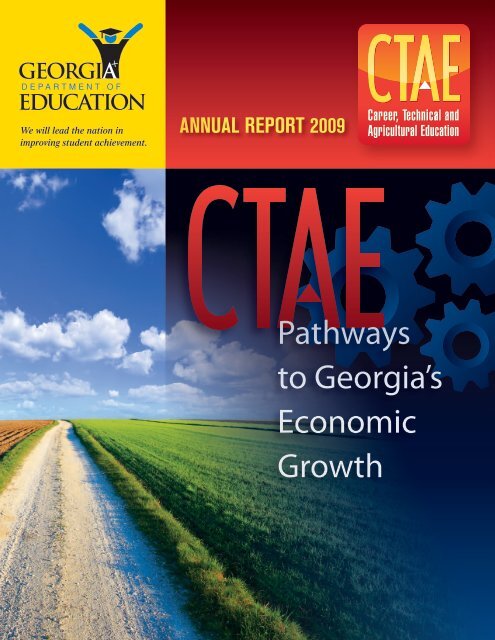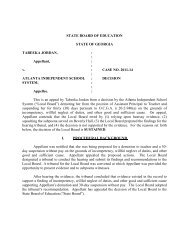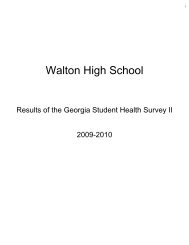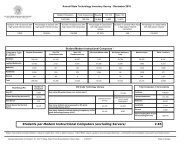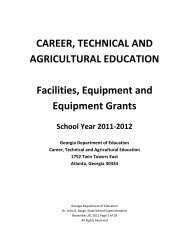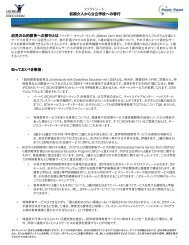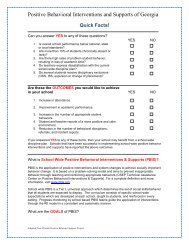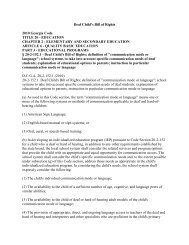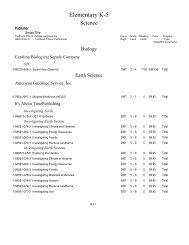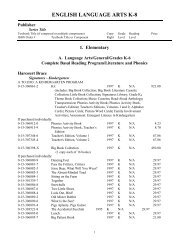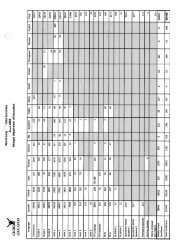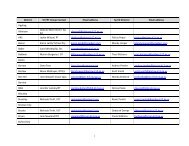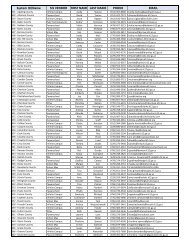CTAE Annual Report (2009) - GADOE Georgia Department of ...
CTAE Annual Report (2009) - GADOE Georgia Department of ...
CTAE Annual Report (2009) - GADOE Georgia Department of ...
Create successful ePaper yourself
Turn your PDF publications into a flip-book with our unique Google optimized e-Paper software.
We will lead the nation in<br />
improving student achievement.<br />
AnnuAl RepoRt <strong>2009</strong><br />
Pathways<br />
to <strong>Georgia</strong>’s<br />
Economic<br />
Growth
Kathy Cox, State Superintendent <strong>of</strong> Schools<br />
Friends and Colleagues,<br />
Thank you for your interest in reading about the <strong>Georgia</strong><br />
<strong>Department</strong> <strong>of</strong> Education’s Career, Technical and Agricultural<br />
Education (<strong>CTAE</strong>) programs. Over the last few years, we have<br />
been developing relevant Career Pathways aligned to the 21 st century workplace,<br />
including crucial job growth areas. These Career Pathways are designed to provide<br />
our <strong>CTAE</strong> students with the knowledge and skills they need to be successful in today’s<br />
world <strong>of</strong> work, and we are pleased to share the details with you in this report.<br />
Students who follow our Career Pathways are not only prepared for their chosen<br />
careers, they are also provided with a real-life connection to what is being taught in<br />
our core classes <strong>of</strong> mathematics, social studies, science, and English. Additionally, our<br />
Career Pathways encourage <strong>CTAE</strong> students to be critical thinkers and problem-solvers,<br />
just what our nation needs in its future leaders. I believe we have one <strong>of</strong> the best<br />
<strong>CTAE</strong> programs in the nation.<br />
In <strong>Georgia</strong>, 138,192 students participate in nine <strong>CTAE</strong> organizations. The activities<br />
and goals <strong>of</strong> these organizations are linked to what is learned in the classroom<br />
and related work experience. Another important focus <strong>of</strong> these organizations is<br />
leadership training. <strong>Georgia</strong>’s national ranking for student participation in these<br />
organizations is outstanding, ranging from first to fourteenth in the nation. We are<br />
very proud <strong>of</strong> their work and their accomplishments.<br />
You will see as you read this report that our <strong>CTAE</strong> program in <strong>Georgia</strong> is stronger than<br />
ever, providing greater opportunities for students to build bridges to a variety <strong>of</strong><br />
careers. Thank you again for your interest in our work.<br />
Sincerely,<br />
Kathy Cox<br />
Office <strong>of</strong> the State Superintendent <strong>of</strong> Schools
CtAe overview 2<br />
Achievements 4<br />
program Areas 5<br />
pathways to <strong>Georgia</strong>’s<br />
economic Growth 14<br />
Future Directions 16<br />
<strong>Annual</strong> <strong>Report</strong> <strong>2009</strong><br />
F R O M T H E D I R E C T O R O F C TA E … .<br />
Friends and Colleagues,<br />
Welcome to our annual report!<br />
If you are reading this report,<br />
you probably have an interest<br />
in <strong>Georgia</strong>’s Career, Technical<br />
and Agricultural Education (<strong>CTAE</strong>)<br />
programs. Preparing students to be<br />
successful in careers has long been<br />
our goal. Additionally, <strong>CTAE</strong> provides students with a strong<br />
foundation in core academic skills and the ability to use those<br />
skills in solving real world problems encountered in business<br />
and industry. In any career, students must also have strong<br />
employability skills, which include work ethics, critical thinking<br />
and dependability. Our goal is to embed these fundamental<br />
skills in all <strong>CTAE</strong> courses. Also embedded in each course are the<br />
critical technical skills our students need to be successful in their<br />
career focus area. Students will be able to utilize these technical<br />
skills along with core academic skills and employability skills in<br />
solving real world problems.<br />
Many positions, typically higher wage positions, require<br />
extensive training and higher level <strong>of</strong> technical skill. By<br />
acquiring more career related pathway specific skills, students<br />
increase their opportunities <strong>of</strong> obtaining career-sustaining<br />
industry certified credentials that are highly valued by<br />
employers.<br />
These broad skill sets prepare students for careers, as well as<br />
additional training at our technical colleges and universities. We<br />
must take such approaches to ensure that our students become<br />
successful in the global economy <strong>of</strong> this 21st century.<br />
Sincerely,<br />
Gary C. Steppe
C T A E O V E R V I E W<br />
Career, Technical & Agricultural Education...<br />
Pathways to <strong>Georgia</strong>’s Economic Growth<br />
<strong>CTAE</strong> At-A-Glance<br />
<strong>Georgia</strong> <strong>Department</strong> <strong>of</strong> Education<br />
2008-<strong>2009</strong> <strong>Georgia</strong> Career, Technical and<br />
Agricultural Education<br />
Secondary Education—Grades 6-12<br />
<strong>CTAE</strong> Programs<br />
180 Local School Systems and 2 Charter Schools<br />
Total <strong>Georgia</strong> Student Enrollment<br />
519,528 Students in Grades 9-12<br />
410,935 Students in Grades 6-8<br />
Student Enrollment in <strong>CTAE</strong> Classes<br />
(Students enrolled in one or more <strong>CTAE</strong> courses)<br />
62% <strong>of</strong> all Students in Grades 9-12 Statewide<br />
(320,625 students)<br />
53% <strong>of</strong> all Students in Grades 6-8 Statewide<br />
(219,009 students)<br />
<strong>CTAE</strong> Enrollment by Gender in Middle and High Schools<br />
Male 51%<br />
Female 49%<br />
<strong>CTAE</strong> Enrollment by Race<br />
Black 36%<br />
Hispanic 10%<br />
White 44%<br />
Other 10%<br />
<strong>CTAE</strong> High School Concentrators<br />
(3 or more classes in a Career Pathway)<br />
76,721 Students<br />
Graduation Rate for <strong>CTAE</strong> Concentrators<br />
91%<br />
Diploma Type Earned by <strong>CTAE</strong> High School Completers<br />
(34,910)<br />
College Prep 17%<br />
Technical/Career 40%<br />
Dual Seal 43%<br />
Student Enrollment is the unduplicated count: Each student is<br />
counted once, although he/she could be enrolled in more than one<br />
<strong>CTAE</strong> program area.<br />
Data Source: <strong>Georgia</strong> <strong>Department</strong> <strong>of</strong> Education Website (2008-<strong>2009</strong><br />
<strong>CTAE</strong> Enrollment), data tables provided by the <strong>CTAE</strong> division, and<br />
Perkin’s IV Consolidated <strong>Annual</strong> <strong>Report</strong> FY 2008-<strong>2009</strong>.<br />
Expanding <strong>Georgia</strong>’s economy depends on a high-tech,<br />
highly skilled workforce to support a broad variety <strong>of</strong><br />
career pathways. The state career and technical education<br />
system consists <strong>of</strong> programs <strong>of</strong>fered at the middle<br />
and secondary school level by the Career, Technical<br />
and Agricultural Education (<strong>CTAE</strong>) Division <strong>of</strong> the <strong>Georgia</strong><br />
<strong>Department</strong> <strong>of</strong> Education (GaDOE) and at the postsecondary<br />
level by the Technical College System <strong>of</strong> <strong>Georgia</strong> (TCSG).<br />
Guidelines <strong>of</strong> the Carl D. Perkins Career and Technical<br />
Education Improvement Act <strong>of</strong> 2006 (Perkins IV) align the <strong>CTAE</strong><br />
program with the academic indicators <strong>of</strong> the No Child Left<br />
Behind Act.<br />
The <strong>CTAE</strong> programs <strong>of</strong>fered to middle and high school<br />
students directly address the <strong>Georgia</strong> <strong>Department</strong> <strong>of</strong> Education<br />
Strategic Plan Goal 3 – Improve Workforce Readiness Skills.<br />
Each <strong>CTAE</strong> Career Pathway integrates a strong academic<br />
preparation with current and emerging career opportunities<br />
and workforce needs and skills, in support <strong>of</strong> the <strong>Georgia</strong><br />
economy. The <strong>CTAE</strong> Career Pathways are designed and<br />
updated on an ongoing basis, in concert with the Governor’s<br />
Office <strong>of</strong> Workforce Development, State Workforce Investment<br />
Board, the state’s colleges and universities, and the Governor’s<br />
Centers <strong>of</strong> Innovation. <strong>Georgia</strong> Career Pathways, widely<br />
recognized as the best in the nation, develop a well-educated,<br />
technically trained and highly competitive workforce that<br />
stimulates the economy.<br />
Programs <strong>of</strong> study under <strong>CTAE</strong>:<br />
Incorporate and align secondary and post-secondary<br />
education<br />
Include academic and <strong>CTAE</strong> content in a coordinated,<br />
non-duplicative progression <strong>of</strong> courses<br />
Include the opportunity for secondary students to<br />
acquire post-secondary credits<br />
Lead to an industry-recognized credential or certificate<br />
at the post-secondary level, or an associate or<br />
baccalaureate degree<br />
Identify and address current or emerging occupational<br />
opportunities<br />
<strong>CTAE</strong> Mission: To prepare students to be successful<br />
as they transition to college and the workforce.
35.5%<br />
15.9%<br />
1.6%<br />
1.8%<br />
4.0%<br />
5.6%<br />
15.7%<br />
Middle School Students (Grades 6-8) Enrolled<br />
in each Program Area in 2008-<strong>2009</strong><br />
Agricultural Education 19,936<br />
Family & Consumer Sciences 82,504<br />
Business & Computer Science 113,037<br />
Engineering & Technology Education 116,462<br />
6.2%<br />
6.8%<br />
7.0%<br />
35.1%<br />
High School Students (Grades 9-12) Enrolled in<br />
each Program Area in 2008-<strong>2009</strong><br />
Culinary Arts 6,642<br />
Government and Public Safety 7,677<br />
Marketing, Sales and Services Education 17,114<br />
Education 23,738<br />
Healthcare Science Education 26,125<br />
Agricultural Education 28,728<br />
Engineering and Technology Education 29,449<br />
Family and Consumer Science 66,544<br />
Architecture, Construction,<br />
Communications & Transportation 67,205<br />
Business and Computer Science 150,491<br />
34.0%<br />
6%<br />
24.9%
A C H I E V E M E N T S<br />
<strong>CTAE</strong> Achievements in 2008-09<br />
Academic Achievements <strong>of</strong> <strong>CTAE</strong> Students<br />
90% <strong>of</strong> <strong>CTAE</strong> Concentrators who took the <strong>Georgia</strong> High School<br />
Graduation Test (GHSGT) met or exceeded state standards in<br />
English/Language Arts<br />
75% <strong>of</strong> <strong>CTAE</strong> Concentrators who took the <strong>Georgia</strong> High<br />
School Graduation Test met or exceeded state standards in<br />
Mathematics<br />
<strong>Georgia</strong> <strong>CTAE</strong> exceeded the federal performance level<br />
targets in all 3 categories <strong>of</strong> Academic Attainment in FY<strong>2009</strong><br />
English/Language Arts<br />
(% passing GHSGT)<br />
Mathematics<br />
(% passing GHSGT)<br />
State FY09<br />
Target<br />
Actual<br />
Performance<br />
85% 90%<br />
69% 75%<br />
Graduation rate 75% 91%<br />
Graduation Rate for <strong>CTAE</strong> Concentrators<br />
91% graduated with regular diplomas in FY<strong>2009</strong><br />
<strong>CTAE</strong> graduation rate <strong>of</strong> 91% compares favorably with<br />
<strong>Georgia</strong>’s overall graduation rate <strong>of</strong> 79% in <strong>2009</strong><br />
<strong>CTAE</strong> Postsecondary Transitions<br />
A total <strong>of</strong> 5,918 high school students dual enrolled in collegelevel<br />
<strong>CTAE</strong> courses at <strong>Georgia</strong>’s technical colleges or other<br />
colleges with technical divisions<br />
A total <strong>of</strong> 1,028 high school students joint enrolled in collegelevel<br />
<strong>CTAE</strong> courses at <strong>Georgia</strong>’s technical colleges or other<br />
colleges with technical divisions<br />
<strong>CTAE</strong> Teacher Acheivements<br />
389 pr<strong>of</strong>essional development workshops were held with<br />
a total attendance <strong>of</strong> 10,950 <strong>CTAE</strong> educators throughout the<br />
state in FY<strong>2009</strong><br />
<strong>CTAE</strong> High School Program Enrollment: Three Year Trend<br />
160,000<br />
140,000<br />
120,000<br />
100,000<br />
80,000<br />
60,000<br />
40,000<br />
20,000<br />
0<br />
AGED ACCT BCS ENGR FACS HCSTE MKT<br />
<strong>CTAE</strong> Program Achievements<br />
443 <strong>CTAE</strong> programs were industry certified in FY <strong>2009</strong><br />
53% <strong>of</strong> all middle school and 62% <strong>of</strong> all high school<br />
students were enrolled in <strong>CTAE</strong> courses in FY<strong>2009</strong><br />
Student enrollment in the following high school <strong>CTAE</strong><br />
programs increased compared to FY2008<br />
New Programs<br />
Culinary Arts (59%)<br />
Education (40%)<br />
Healthcare Science Education (10%)<br />
Marketing, Sales & Services Education (6%)<br />
Architecture, Construction, Communication, and<br />
Transportation (1%)<br />
Agricultural Education (.3%)<br />
Family and Consumer Sciences (.2%)<br />
Student enrollment in the following middle school <strong>CTAE</strong><br />
programs increased compared to FY2008<br />
Agriculture Education (4.3%)<br />
Engineering and Technologyl Education (3.8%)<br />
Student membership in Career Technical Student<br />
Organizations numbered 138,192 in FY <strong>2009</strong><br />
Student membership increased in 5 <strong>of</strong> the 9 Career<br />
Technical Student Organizations compared to last year’s<br />
participation level<br />
Three <strong>Georgia</strong> Career Technical Student Organizations<br />
were ranked 1 st in the nation in student participation:<br />
Future Business Leaders <strong>of</strong> America (FBLA); Family , Career<br />
and Community Leaders <strong>of</strong> America (FCCLA); and <strong>Georgia</strong><br />
Technology Association (TSA); Future Farmers <strong>of</strong> America<br />
(FFA) ranked 3 rd in the nation<br />
97% <strong>of</strong> employers participating in the <strong>Georgia</strong> Youth<br />
Apprenticeship Program agreed that students performed<br />
at the level expected<br />
95% <strong>of</strong> employers participating in the <strong>Georgia</strong> Youth<br />
Apprenticeship Program found the program beneficial to<br />
their company and 93% rated the program above average<br />
<strong>CTAE</strong> Middle School Program Enrollment: Three Year Trend<br />
160,000<br />
140,000<br />
120,000<br />
100,000<br />
80,000<br />
60,000<br />
40,000<br />
20,000<br />
0<br />
AGED BCS ENGR FACS<br />
2006–07<br />
2007–08<br />
2008–09
P R O G R A M A R E A S<br />
<strong>CTAE</strong> CArEEr PAThwAys –<br />
All the Right Programs…High School and Middle School Curriculum, Assessment,<br />
and Work-Based Learning… Working Together for <strong>Georgia</strong>’s Students<br />
In FY <strong>2009</strong> <strong>Georgia</strong> Career, Technical and Agricultural Education<br />
<strong>of</strong>fered high school students over 50 Career Pathways. Each<br />
Career Pathway is a state-approved career enhancement program<br />
and is designed as a coherent, articulated sequence <strong>of</strong> rigorous<br />
academic and career-related courses.<br />
Middle school students participated in Career Exploration<br />
classes that are integrated in the curriculum, used tools from<br />
the GAcollege411 website to explore career options, engaged in<br />
student/parent advisement conferences, worked on an 8 th Grade<br />
Pathway Project, and selected a Career Pathway.<br />
Selecting career pathway courses in high<br />
school will enable students to have a<br />
head start toward a successful future.<br />
At the high school level, students may explore various Career<br />
Pathway courses or take a sequence <strong>of</strong> three courses in a single<br />
Career Pathway (<strong>CTAE</strong> Concentrator). These courses usually begin<br />
in the 9 th grade and lead to an industry-recognized certificate or<br />
licensure, an associate degree, or baccalaureate degree and beyond.<br />
Career pathways <strong>of</strong>fer students options to explore and gain<br />
marketable skills in specific career areas that lead to high-demand,<br />
high-wage, and high-skilled jobs required to support the <strong>Georgia</strong><br />
economy. Students create individualized Peach State Pathway<br />
Career Plans to guide their secondary and postsecondary education<br />
and participate in end-<strong>of</strong>-pathway assessments.<br />
<strong>CTAE</strong> Career Pathways<br />
High School Foundation Skills<br />
Technical Skills<br />
Academic Foundations<br />
Communications<br />
Problem Solving and Critical Thinking<br />
Information Technology Applications<br />
Organizational Systems<br />
Safety, Health and Environment<br />
Leadership and Teamwork<br />
Ethics and Legal Responsibilities<br />
Career Development<br />
Entrepreneurship<br />
Education-Career Partnership Initiative<br />
Through the Education-Career Partnership the <strong>Georgia</strong><br />
<strong>Department</strong> <strong>of</strong> Education, the Technical College System<br />
<strong>of</strong> <strong>Georgia</strong>, and the <strong>Georgia</strong> Board <strong>of</strong> Regents strengthen<br />
and expand seamless education opportunities to benefit<br />
<strong>Georgia</strong> high school students as they pursue their chosen<br />
careers. <strong>Georgia</strong>’s technical colleges and other colleges and<br />
universities with technical divisions provide postsecondary<br />
education options for high school students that enhance their<br />
education in their identified Career Pathway. The Education-<br />
Career Partnership Initiative, an integral part <strong>of</strong> <strong>CTAE</strong> Program<br />
Career Pathways, makes it possible for high school students to<br />
participate in college classes through dual enrollment, joint<br />
enrollment, and articulated classes. Students may graduate<br />
high school with college credits and in some cases Certificates,<br />
Diplomas, or Associate Degrees in a career area.<br />
Number <strong>of</strong> High School Students Enrolled in College Level Courses<br />
FY <strong>2009</strong><br />
<strong>Georgia</strong> Technical<br />
Colleges<br />
<strong>Georgia</strong> Colleges<br />
with Technical<br />
Divisions<br />
Total student<br />
enrollment<br />
<strong>CTAE</strong> Career Pathways<br />
High School Learning Opportunities<br />
Classroom and Laboratory Work<br />
Career related learning experiences such as<br />
Work-Based Education and Youth Apprenticeship<br />
Program<br />
Membership and active participation in local,<br />
state, and national Career Technical Student<br />
Organizations (CTSO)<br />
Postsecondary education opportunities during<br />
high school<br />
Dual<br />
enrollment<br />
courses<br />
Joint<br />
enrollment<br />
courses<br />
Total<br />
student<br />
enrollment<br />
5,685 1,013 6,998<br />
233 15 248<br />
5,918 1,028 6,946<br />
Our <strong>CTAE</strong> program in <strong>Georgia</strong> is stronger than ever, providing greater<br />
opportunities for students to build bridges to a variety <strong>of</strong> careers.<br />
— Kathy Cox, Superintendent <strong>of</strong> Schools<br />
<strong>Georgia</strong> <strong>Department</strong> <strong>of</strong> Education
P R O G R A M A R E A S<br />
AGRICULTURE EDUCATION (AGED) 2008-<strong>2009</strong><br />
Enrollment by Gender in Grades 9-12<br />
(Unduplicated Count)<br />
High School Student Enrollment in Agriculture Education in<br />
FY <strong>2009</strong><br />
(Duplicated Count)<br />
Grade 6-8 Student Enrollment in Agriculture Education Courses<br />
in FY <strong>2009</strong><br />
Number <strong>of</strong> Industry-Certified Programs 22<br />
Total 28,728<br />
Male 19,061 (66%)<br />
Female 9,667 (34%)<br />
Pathway-Related Course Enrollment – 82,543<br />
• Agriculture Mechanics 13,682 (17%)<br />
• Plant Science/Horticulture 14,745 (18%)<br />
• Agriscience 11,663 (14%)<br />
• Animal Science 11,540 (14%)<br />
• Forestry & Natural Resources 11,523 (14%)<br />
• Veterinary Science 9,697 (12%)<br />
• Agribusiness Management 9,693 (12%)<br />
Other AGED Courses<br />
• 3,301<br />
19,936<br />
Number <strong>of</strong> <strong>CTAE</strong> Certified Teachers FY <strong>2009</strong> 456 High School Teachers<br />
76 Middle School Teachers<br />
Career Technical Student Organization (CTSO)<br />
Future Farmers <strong>of</strong> America (FFA): 29,304 members<br />
<strong>Georgia</strong> FFA had 7 national winners and was recognized for the largest membership growth at the<br />
82nd National FFA Convention. Following the FFA motto “Learning to Do, Doing to Learn, Earning<br />
to Live, Living to Serve” FFA students are <strong>of</strong>fered a variety <strong>of</strong> experimental learning opportunities and<br />
competitions that focus on leadership and public speaking. By complimenting classroom and lab<br />
instruction in agricultural education, FFA develops students’ potential for career success and provides<br />
optimal opportunities for them to become successful, productive citizens.<br />
AGRICULTURE EDUCATION (AGED) is composed <strong>of</strong> three<br />
interrelated components including classroom and laboratory<br />
experiences, Supervised Agricultural Experience Program<br />
incorporating real-life on-the-job skills, and the Future Farmers<br />
<strong>of</strong> America student organization for developing leadership<br />
skills. The program combines agriculture technical skills with<br />
rigorous coursework, leadership training, and an exploration<br />
<strong>of</strong> the ethical and philosophical issues related to genetic<br />
engineering and other current agricultural topics. Agriculture<br />
generates over $25 billion annually to the <strong>Georgia</strong> economy<br />
and <strong>CTAE</strong> supports this Strategic Industry identified by the<br />
Governor.
ARCHITECTURE, CONSTRUCTION, COMMUNICATIONS &<br />
TRANSPORTATION (ACCT) programs equip students with<br />
the knowledge, skills, and attitudes necessary for successful<br />
employment in the trade and industrial field and for further<br />
education. In addition to classroom and laboratory experiences,<br />
students participate in work-based learning and SkillsUSA, the<br />
youth organization with opportunities to develop academic,<br />
technical, and citizenship skills.<br />
ARCHITECTURE, CONSTRUCTION, COMMUNICATIONS & TRANSPORTATION (ACCT) 2008-<strong>2009</strong><br />
Enrollment by Gender in Grades 9-12<br />
(Unduplicated Count)<br />
High School Student Enrollment in Architecture,<br />
Construction & Transportation Education in<br />
FY <strong>2009</strong><br />
(Duplicated Count)<br />
Number <strong>of</strong> Industry-Certified Programs: 120<br />
Total 67,205<br />
Male 45,658 (68%)<br />
Female 21,547 (32%)<br />
Pathway-Related Course Enrollment -- 77,197<br />
• Construction 12,913 (17%)<br />
• Transportation/Logistical Support – Ground Marine 10,915 (14%)<br />
• Broadcast/Video Production 10,089 (13%)<br />
• Transportation/Logistical Operations – Ground Marine 9,854 (13%)<br />
• Heating, Ventilation, Air Conditioning, and Refrigeration (HVACR) 8,197<br />
(11%)<br />
• Architectural Drawing & Design 6,790 (9%)<br />
• Graphic Communications 6,006 (8%)<br />
• Graphic Design 6,006 (8%)<br />
• Metals 4,310 (6%)<br />
• Flight Operations 969 (1%)<br />
• Collision Repair 934 (1%)<br />
• Aircraft Support 214 (less than 1%)<br />
Other ACCT Courses<br />
• 2,722<br />
Number <strong>of</strong> <strong>CTAE</strong> Certified Teachers FY <strong>2009</strong> 634 High School Teachers<br />
Career Technical Student Organization (CTSO)<br />
<strong>Georgia</strong> SkillsUSA: 6,768 members<br />
SkillsUSA <strong>Georgia</strong> helps each student excel by participating in local, state, and national activities<br />
provided through trade and industrial, technical, and health occupations courses and programs.<br />
Students develop leadership skills and workplace competencies needed to succeed in a constantly<br />
changing global workplace. In 2008, SkillsUSA <strong>Georgia</strong> received national recognition in the Best <strong>of</strong><br />
Brand Print Award for publications.<br />
The opportunities in construction in <strong>Georgia</strong> far outstrip the qualified manpower available. People who can<br />
handle a variety <strong>of</strong> different tasks and are knowledgeable about different types <strong>of</strong> construction issues can<br />
always find a place in the construction business.<br />
—President, Goodman Decorating, Atlanta
P R O G R A M A R E A S<br />
BUSINESS & COMPUTER SCIENCE (BCS) 2008-<strong>2009</strong><br />
Enrollment by Gender in Grades 9-12<br />
(Unduplicated Count)<br />
High School Student Enrollment in Business and Computer<br />
Science in FY <strong>2009</strong><br />
(Duplicated Count)<br />
Grade 6-8 Student Enrollment in Business and Computer<br />
Science Courses in FY <strong>2009</strong><br />
Number <strong>of</strong> Industry-Certified Programs: 127<br />
Total 150,491<br />
Male 78,671 (52%)<br />
Female 71,820 (48%)<br />
Pathway-Related Course Enrollment – 211,258<br />
• Administration/Information Support 61,859 (29%)<br />
• Small Business Development 38,161 (18%)<br />
• Financial Mgmt. – Accounting 35,859 (17%)<br />
• Financial Mgmt. – Services 31,992 (15%)<br />
• Interactive Media 25,576 (12%)<br />
• Computing 15,212 (7%)<br />
• Computer Systems & Support 1,571 (less than 1%)<br />
• Computer Networking 1,028 (less than 1%)<br />
Other BCS Courses<br />
• 9,351<br />
113,037<br />
Number <strong>of</strong> <strong>CTAE</strong> Certified Teachers FY <strong>2009</strong> 1,766 High School Teachers<br />
365 Middle School Teachers<br />
Career Technical Student Organization (CTSO)<br />
Future Business Leaders <strong>of</strong> America (FBLA): 23,721 members<br />
<strong>Georgia</strong> FBLA, the largest FBLA chapter in the nation, prepares students to be competent, aggressive,<br />
successful business leaders. Through innovative leadership and career development programs,<br />
business and education are brought together in a positive working relationship. <strong>Georgia</strong> FBLA goals<br />
include strengthening the confidence <strong>of</strong> students in themselves and their work, creating interest in<br />
and understanding <strong>of</strong> American business enterprise, encouraging efficient money management, and<br />
facilitating students’ transition from school to work. Following the motto “Service, Education, and<br />
Progress” FBLA students stay involved in community service projects.<br />
BUSINESS and COMPUTER SCIENCE (BCS) programs prepare<br />
students to become productive members <strong>of</strong> the business<br />
community and to enter a post-high school institution after<br />
graduation. Entrepreneurs, innovators, and small businesses<br />
play a key role in <strong>Georgia</strong>’s economic growth with over 810,000<br />
small businesses contributing to the state economy.<br />
Business and Computer Science programs in <strong>Georgia</strong>’s high schools provide students the<br />
opportunity to learn about the business community. <strong>Georgia</strong>’s economic prosperity depends<br />
upon an educated population to operate, initiate, and expand business in the 21 st century.<br />
These programs in our high schools provide students the foundation to be the business<br />
leaders <strong>of</strong> tomorrow.<br />
—Monica Anderton, Human Resources Manager<br />
BellSouth.Net, Inc., Atlanta, <strong>Georgia</strong>
ENGINEERING AND TECHNOLOGY EDUCATION (ENGR) 2008-<strong>2009</strong><br />
Enrollment by Gender in Grades 9-12<br />
(Unduplicated Count)<br />
High School Student Enrollment in Engineering and<br />
Technology Education in FY <strong>2009</strong><br />
(Duplicated Count)<br />
Grade 6-8 Student Enrollment in Engineering and<br />
Technology Education Courses in FY <strong>2009</strong><br />
Number <strong>of</strong> Industry-Certified Programs: 51<br />
ENGINEERING AND TECHNOLOGY EDUCATION (ENGR)<br />
utilizes computer and educational technology in the delivery <strong>of</strong><br />
content related to systems <strong>of</strong> communication, energy/power,<br />
transportation, production, and bio-related technologies.<br />
Technology education develops technological literacy as a part<br />
<strong>of</strong> the students’ fundamental education through an activitybased<br />
study <strong>of</strong> past, present, and future technological systems<br />
and their resources, processes, and impact on society.<br />
Total 29,449<br />
Male 22,418 (76%)<br />
Female 7,031 (24%)<br />
Pathway-Related Courses Enrollment -- 42,171<br />
• Engineering 19,359 (46%)<br />
• Energy Systems 13,619 (33%)<br />
• Engineering Graphics & Design 6,959 (17%)<br />
• Manufacturing 1,155 (3%)<br />
• Electronics 1,079 (3%)<br />
Other ENGR Courses<br />
• 630<br />
116,462<br />
Number <strong>of</strong> <strong>CTAE</strong> Certified Teachers FY <strong>2009</strong> 487 High School Teachers<br />
279 Middle School Teachers<br />
Career Technical Student Organization (CTSO)<br />
Technology Student Association (TSA): 22,212 members<br />
The Technology Student Association (TSA) motto “Learning to Live in a Technical World” is achieved<br />
by providing students opportunities to develop competitive skills in communication and leadership<br />
through the technology education program. A wide variety <strong>of</strong> event competitions such as Animatronics,<br />
Cyberspace Pursuit, Dragster Design, Flight Endurance, Transportation Modeling, Manufacturing<br />
Prototype, and Medical Technology allow students to demonstrate their skills. TSA students develop good<br />
attitudes concerning work, tools, materials, experimentation, and processes <strong>of</strong> industry.<br />
Technical Education is critical to our business. We see the need for technical<br />
competency growing at all levels within our organization.<br />
—Jim Wallace, Director <strong>of</strong> Operations<br />
Selectron <strong>Georgia</strong>, Suwanee, <strong>Georgia</strong>
P R O G R A M A R E A S<br />
FAMILY AND CONSUMER SCIENCES (FACS) AND CULINARY ARTS 2008-<strong>2009</strong><br />
FAMILY AND CONSUMER SCIENCES (FACS) education <strong>of</strong>fers a unique focus on families, work, and their interrelationships,<br />
providing a solid foundation for success in a broad range <strong>of</strong> careers that require strong leadership, pr<strong>of</strong>essional, and<br />
interpersonal skills. Students learn to manage resources to meet the essential needs <strong>of</strong> individuals and families, to promote<br />
optimal nutrition and wellness across the life span, and to accept responsibility for actions and success in family, work, and<br />
the diverse global society.<br />
Enrollment by Gender in Grades 9-12<br />
(Unduplicated Count)<br />
High School Student Enrollment in Family and Consumer<br />
Sciences Education in FY <strong>2009</strong><br />
(Duplicated Count)<br />
Grade 6-8 Student Enrollment in Family and Consumer<br />
Science Courses in FY <strong>2009</strong><br />
Total 77,192<br />
Male 17,927 (23%)<br />
Female 59,265 (77%)<br />
Pathway-Related Courses Enrollment – 29,387<br />
• Nutrition & Food Science 23,137 (79%)<br />
• Interior & Fashion Design 5,553 (19%)<br />
• Consumer Sciences 697 (2%)<br />
Other FACS Courses<br />
• 12,337<br />
82,504<br />
Number <strong>of</strong> <strong>CTAE</strong> Certified Teachers FY <strong>2009</strong> 450 High School Teachers<br />
209 Middle School Teachers<br />
CULINARY ARTS is a growing program based on the American Culinary<br />
Federation Standards and with articulations with postsecondary institutions.<br />
Culinary Arts is designed for students wanting to learn the “art” <strong>of</strong> cooking<br />
in many diverse settings, such as Sous Chef, Pastry Chef, Kitchen Manager,<br />
Garde Manager, Banquet Chef, or Restaurant Entrepreneur.<br />
Enrollment by Gender in Grades 9-12<br />
(Unduplicated Count)<br />
High School Student Enrollment in Culinary Arts in FY <strong>2009</strong><br />
(Duplicated Count)<br />
Number <strong>of</strong> Industry-Certified Programs 5<br />
Total 6,642<br />
Male 1,594 (24%)<br />
Female 5,048 (76%)<br />
Pathway-Related Courses Enrollment – 7,467<br />
Number <strong>of</strong> <strong>CTAE</strong> Certified Teachers FY <strong>2009</strong> 119 High School Teachers<br />
Career Technical Student Organization (CTSO)<br />
Family, Career and Community Leaders <strong>of</strong> America (FCCLA): 28,398 members<br />
Family, Career, Community Leaders <strong>of</strong> America (FCCLA) promotes students’ personal growth and<br />
leadership development through family and consumer sciences education. Students are prepared for the<br />
multiple roles <strong>of</strong> family member, wage earner, and community leader. Members participate in a variety<br />
<strong>of</strong> community service projects and competitions. Student benefits include career preparation, personal<br />
growth and enhanced self-esteem, and leadership experiences.
HEALTHCARE SCIENCE EDUCATION (HCSTE) AND GOVERNMENT & PUBLIC SAFETY 2008-<strong>2009</strong><br />
HEALTHCARE SCIENCE EDUCATION (HCSTE) programs<br />
provide a pipeline for the healthcare workers <strong>of</strong> the future.<br />
According to the <strong>Georgia</strong> <strong>Department</strong> <strong>of</strong> Labor, by the year<br />
2014, health services will account for one in every twelve<br />
jobs in <strong>Georgia</strong>. The healthcare field is projected to increase<br />
by almost 100,000 jobs, placing its employment levels<br />
at more than 420,000 jobs by 2014. Students learn basic<br />
concepts <strong>of</strong> health, wellness, and preventative care, medical<br />
terminology, microbiology, life-support skills, and the ethical<br />
and legal responsibilities <strong>of</strong> healthcare providers as well as<br />
problem solving and decision making skills.<br />
Enrollment by Gender in Grades 9-12<br />
(Unduplicated Count)<br />
High School Student Enrollment in Healthcare Science<br />
Education (HCSTE) Education in FY <strong>2009</strong><br />
(Duplicated Count)<br />
Number <strong>of</strong> Industry-Certified Programs: 50<br />
Total 26,125<br />
Male 4,404 (17%)<br />
Female 21,721 (83%)<br />
Number <strong>of</strong> <strong>CTAE</strong> Certified Teachers FY <strong>2009</strong> 353 High School Teachers<br />
Pathway-Related Course Enrollment – 126,084<br />
• Therapeutic Services- Nursing 22,488 (18%)<br />
• Therapeutic Services- Medical 21,096 (17%)<br />
• Therapeutic Services- Emergency 16,057 (13%)<br />
• Health Informatics 15,779 (13%)<br />
• Diagnostic Services 15,211 (12%)<br />
• Physical Medicine 15,200 (12%)<br />
• Biotechnology Research & Development 15,159 (12%)<br />
• Personal Care Services -- Cosmetology 5,094 (4%)<br />
GOVERNMENT & PUBLIC SAFETY focuses on two career pathways: Homeland Security and Emergency Services, and Law<br />
and Justice. Students are prepared to be qualified pr<strong>of</strong>essionals providing a dedicated public safety workforce for the future.<br />
Enrollment by Gender in Grades 9-12<br />
(Unduplicated Count)<br />
High School Student Enrollment in Government and Public<br />
Safety in FY <strong>2009</strong><br />
(Duplicated Count)<br />
Number <strong>of</strong> Industry-Certified Programs 5<br />
Total 7,677<br />
Male 4,421 (57%)<br />
Female 3,256 (43%)<br />
Pathway-Related Courses Enrollment – 5,656<br />
Number <strong>of</strong> <strong>CTAE</strong> Certified Teachers FY <strong>2009</strong> 83 High School Teachers<br />
Career Technical Student Organization (CTSO)<br />
Health Occupations Students <strong>of</strong> America (HOSA): 7,446 members<br />
Health Occupations Students <strong>of</strong> America (HOSA) promotes career opportunities in the health care industry<br />
and enhances the delivery <strong>of</strong> quality health care to all people by providing a unique program <strong>of</strong> leadership<br />
development, motivation, and recognition for HSTE students. HOSA’s mission is especially critical to help fill<br />
shortages <strong>of</strong> qualified workers for the health care industry.
P R O G R A M A R E A S<br />
MARkETING, SALES AND SERVICES EDUCATION (MkT) 2008-<strong>2009</strong><br />
MARkETING, SALES AND SERVICES EDUCATION (MkT) prepares students<br />
for postsecondary education and careers in marketing, management, and<br />
entrepreneurship. Students develop knowledge and skills in the foundation<br />
areas <strong>of</strong> marketing (economics, human relations and business basics) and<br />
the functional areas <strong>of</strong> marketing (product and service planning, marketing<br />
information management, purchasing and pricing, selling and promotion, risk<br />
management, financing and distribution/logistics), as well as international<br />
marketing, management, and entrepreneurship.<br />
Enrollment by Gender in Grades 9-12<br />
(Unduplicated Count)<br />
High School Student Enrollment in Marketing, Sales and<br />
Services Education (MkT) in FY <strong>2009</strong><br />
(Duplicated Count)<br />
Number <strong>of</strong> Industry-Certified Programs: 65<br />
Total 17,114<br />
Male 7,645 (45%)<br />
Female 9,469 (58%)<br />
Pathway-Related Course Enrollment – 51,732<br />
Number <strong>of</strong> <strong>CTAE</strong> Certified Teachers FY <strong>2009</strong> 183 High School Teachers<br />
• Marketing & Management 11,223 (22%)<br />
• Fashion Marketing 11,114 (21%)<br />
• Sports & Entertainment Marketing 10,748 (21%)<br />
• Marketing Communication & Promotion 9,434 (18%)<br />
• Travel Marketing & Lodging Management 9,213 (18%)<br />
Other MkT Courses<br />
• 742<br />
Career Technical Student Organization (CTSO)<br />
DECA: 8,735 members<br />
DECA develops future leaders in marketing, management and entrepreneurship. Members become aware<br />
<strong>of</strong> the value <strong>of</strong> community service; participate in competitive events that showcase student skills and allow<br />
for interaction with the business community; serve in leadership roles; and develop a greater understanding<br />
<strong>of</strong> our competitive, free-enterprise system and an appreciation <strong>of</strong> the responsibilities <strong>of</strong> citizenship.<br />
EDUCATION 2008-<strong>2009</strong><br />
EDUCATION programs are designed for students interested in pursuing a career in the education field from early childhood<br />
education through postsecondary education. These pathways introduce the foundations <strong>of</strong> education, combined with<br />
knowledge and skills essential for educators.<br />
Enrollment by Gender in Grades 9-12<br />
(Unduplicated Count)<br />
High School Student Enrollment in Education in FY <strong>2009</strong><br />
(Duplicated Count)<br />
Number <strong>of</strong> Industry-Certified Programs 3<br />
Total 23,738<br />
Male 2,937 (12%)<br />
Female 20,801 (88%)<br />
Pathway-Related Courses Enrollment – 24,068<br />
• Teaching as a Pr<strong>of</strong>ession 3,961 (16%)<br />
• Early Childhood Education 20,107 (84%)<br />
Number <strong>of</strong> <strong>CTAE</strong> Certified Teachers FY <strong>2009</strong> 422 High School Teachers
COORDINATED CAREER ACADEMIC EDUCATION/PROJECT SUCCESS (CCAE/PS) 2008-<strong>2009</strong><br />
Enrollment by Gender in Grades 9-12<br />
(Unduplicated Count)<br />
COORDINATED CAREER ACADEMIC EDUCATION/PROJECT SUCCESS (CCAE/PS) provides educational and occupational<br />
services to assist students in becoming responsible, productive citizens. Through participation in the CCAE/PS support<br />
services, students in grades 9-12 learn about the world <strong>of</strong> work and employment skills they need to be successful.<br />
Throughout their school years, students have the opportunity to develop knowledge, attitudes and experiences that will<br />
serve as a substantial base for decision making when they reach points in their lives when they must make education or<br />
career decisions.<br />
CAREER AND TECHNICAL INSTRUCTION (CTI) 2008-<strong>2009</strong><br />
Enrollment by Gender in Grades 9-12<br />
(Unduplicated Count)<br />
Number <strong>of</strong> <strong>CTAE</strong> Certified Teachers<br />
FY <strong>2009</strong><br />
Total 6,930<br />
Male 4,457 (64%)<br />
Female 2,473 (36%)<br />
262 High School Teachers<br />
Total 5,779<br />
Male 2,757 (48%)<br />
Female 3,022 (52%)<br />
Number <strong>of</strong> <strong>CTAE</strong> Certified Teachers FY <strong>2009</strong> 76 High School Teachers<br />
Career Technical Student Organizations (CTSO)<br />
<strong>Georgia</strong> Career Student Association (GCSA): 4,678 members<br />
<strong>Georgia</strong> Career Student Association (GCSA) helps students learn about the world <strong>of</strong> work and the<br />
employment skills they need to be successful. Through GCSA students are assisted in reaching their<br />
potential and becoming well-rounded individuals. Members develop confidence and maturity through<br />
meeting challenges and completing projects.<br />
CAREER AND TECHNICAL INSTRUCTION (CTI)<br />
is designed to support students with disabilities<br />
enrolled in <strong>CTAE</strong> classes and in participation in<br />
Career Technical Student Organizations. The<br />
goal <strong>of</strong> the secondary level support services is to<br />
provide students with employment opportunities<br />
at the completion <strong>of</strong> their <strong>CTAE</strong> experience.<br />
JUNIOR RESERVE OFFICERS TRAINING CORPS (JROTC) 2008-<strong>2009</strong><br />
High School Student Enrollment in<br />
JROTC-Related Courses in FY <strong>2009</strong><br />
by Type <strong>of</strong> Service<br />
• U.S. Army 15,956<br />
• U. S. Air Force 7,498<br />
• U.S. Navy 6,232<br />
• U.S. Marines 1,895<br />
Scholarship Awards Earned in FY <strong>2009</strong> • $ 34,315,895<br />
Community Service Hours Contributed<br />
by JROTC Units<br />
• 690,430 hours<br />
JUNIOR RESERVE OFFICERS TRAINING CORPS (JROTC) <strong>of</strong>fers the opportunity for high school students to enroll in a<br />
citizenship program that combines classroom instruction and practical application with extracurricular activities. The<br />
curriculum teaches leadership, time management, and organizational procedures, the rights, and privileges <strong>of</strong> citizenship,<br />
and how our military serves our government. It helps to develop the student cadet’s sense <strong>of</strong> personal responsibility, build<br />
life skills, and provide leadership opportunities. JROTC, under the umbrella <strong>of</strong> the Career, Technical and Agricultural Education<br />
Division <strong>of</strong> the <strong>Georgia</strong> <strong>Department</strong> <strong>of</strong> Education, <strong>of</strong>fers courses that satisfy pathway concentration provisions as students<br />
earn credit toward graduation.
P A T H W A Y S F O R G E O R G I A ’ S E C O N O M I C G R O W T H<br />
<strong>CTAE</strong> VISION:<br />
Creating a world-class workforce for <strong>Georgia</strong> in the 21 st Century<br />
With the national economic downturn, the State <strong>of</strong><br />
<strong>Georgia</strong> is aggressively addressing many challenges<br />
to retain a growing, dynamic economy. It is especially<br />
critical for the state to maintain and build the current<br />
and future workforce to meet the changing needs <strong>of</strong><br />
business and industry as the state and regional economy<br />
rebounds. Education continues to be an essential part<br />
<strong>of</strong> the <strong>Georgia</strong> workforce development infrastructure and<br />
is a critical focus <strong>of</strong> the Governor’s <strong>Georgia</strong> Work Ready<br />
program.<br />
<strong>Georgia</strong> Work Ready was launched in August 2006 by<br />
Governor and the <strong>Georgia</strong> Chamber <strong>of</strong> Commerce to<br />
improve the job training and marketability <strong>of</strong> <strong>Georgia</strong>’s<br />
workforce and to drive future economic growth for the state.<br />
It is the only initiative <strong>of</strong> its kind to be conducted through a<br />
partnership between a state government and state chamber<br />
<strong>of</strong> commerce ensuring that companies can more reliably<br />
match the right people with the right jobs. Work Ready is<br />
based on a skills assessment and certification for job seekers<br />
and a job pr<strong>of</strong>iling system for businesses. By identifying<br />
both the needs <strong>of</strong> business and the available skills <strong>of</strong><br />
<strong>Georgia</strong>’s workforce, the state can more effectively generate<br />
the right talents for the right jobs.<br />
Workforce Development Infrastructure<br />
Commission<br />
for a New<br />
<strong>Georgia</strong><br />
State<br />
Workforce<br />
Investment<br />
Board<br />
Governor’s<br />
Office <strong>of</strong><br />
Workforce<br />
Development<br />
The <strong>Georgia</strong> Work Ready Certificate provides a<br />
comprehensive measure <strong>of</strong> foundation skills that contribute<br />
to workplace success and enables individuals to demonstrate<br />
to employers a fitness for employment as well as readiness<br />
for increased salaries and promotions. <strong>Georgia</strong> Work Ready<br />
results provide potential employers with information related<br />
to the potential employee’s education, skills, and training, as<br />
well as good work habits. Students in high school benefit by<br />
an increased understanding <strong>of</strong> work readiness skills which<br />
helps them make the connection between education and<br />
work and leads to an increase in the graduation rate and<br />
recognition by prospective employers as a viable candidate for<br />
a job. Businesses benefit by sharing a common language with<br />
education and are ensured that the individual is “job ready”.<br />
This reduces hiring costs and employee turnover.<br />
Job seekers provide employers with their Work Ready Certificate<br />
to demonstrate that they are ready for employment. Educators<br />
may use information from the Work Ready program to tailor<br />
instructional development plans, certify workforce readiness,<br />
and guarantee diplomas. Employers use the system to<br />
determine hiring qualifications and training needs. Economic<br />
and workforce developers match employers with communities<br />
to ensure the best possible workforce.<br />
Education<br />
Workforce<br />
Development<br />
Economic<br />
Development<br />
We need a system that links workforce development and education together and<br />
aligns to the economic needs <strong>of</strong> the state, its regions and local communities.<br />
—Governor Sonny Purdue, State <strong>of</strong> <strong>Georgia</strong>
A number <strong>of</strong> <strong>Georgia</strong><br />
high school students<br />
complete the Work<br />
Ready assessment as a<br />
part <strong>of</strong> their preparation for the workplace.<br />
According to the Governor’s Office <strong>of</strong> Workplace<br />
Development, during the current three-year period<br />
more than 32,000 high school students have<br />
completed the Work Ready assessment. High school<br />
seniors account for a third <strong>of</strong> all assessments<br />
completed. Combined with their high<br />
school diploma, students strengthen their<br />
work credentials with the <strong>Georgia</strong> Work<br />
Ready Certificate.<br />
<strong>Georgia</strong>’s <strong>CTAE</strong> Career Paths are<br />
strengthened in the workplace with<br />
Industry Certification in many areas.<br />
Industry Certification is a mark <strong>of</strong> excellence for the<br />
student and is recognized by employers. Educators<br />
work with state industry associations and subject<br />
experts to create the requirements for industry<br />
certification, which ensures that students have the<br />
skills and knowledge using the latest equipment and<br />
technology to be ready to work in the high-demand,<br />
high-wage, high-skill jobs available in <strong>Georgia</strong>.<br />
Work-Based Education opportunities and<br />
postsecondary education options <strong>of</strong>fered during<br />
and following high school enable students to<br />
fulfill their career plans. The state <strong>of</strong> <strong>Georgia</strong> is<br />
unique in its support <strong>of</strong> postsecondary education<br />
options through the HOPE Program with HOPE<br />
grants and scholarships available to secondary<br />
Programs/Initiatives <strong>of</strong> the <strong>CTAE</strong><br />
Industry<br />
Certification<br />
Assessment<br />
High School &<br />
Middle School<br />
Curriculum<br />
Development<br />
Work-Based<br />
Learning<br />
Special Populations<br />
Nontraditional<br />
Occupations<br />
Career Pathways for Emerging, Transitioning<br />
and Existing Careers<br />
Work Readiness<br />
Foundational Skills<br />
Work Ready Certificates<br />
Work Ready Job Pr<strong>of</strong>iles<br />
Work Habits Assessment<br />
and postsecondary students, to enhance their school-based<br />
preparation for the workplace.<br />
Across <strong>Georgia</strong>, a broad range <strong>of</strong> state and nonpr<strong>of</strong>it agencies<br />
are working together to stimulate the growth <strong>of</strong> the state<br />
economy and to ensure <strong>Georgia</strong> has a well-educated workforce<br />
that meets the needs <strong>of</strong> current as well as new businesses and<br />
industries that make up the backbone <strong>of</strong> the <strong>Georgia</strong> economy.<br />
A readily available, trained workforce is the key to maintaining<br />
and attracting companies to settle and expand in <strong>Georgia</strong>. The<br />
State <strong>of</strong> <strong>Georgia</strong> has created a strong structure to stimulate<br />
economic growth.<br />
<strong>Georgia</strong> Work<br />
Ready<br />
Education &<br />
Career<br />
Partnerships<br />
Career<br />
Development<br />
HSTW/JROTC<br />
Pr<strong>of</strong>essional<br />
Learning<br />
knowledge<br />
Pre-K, K-12, community colleges,<br />
technical colleges, colleges<br />
and universities<br />
Experience<br />
On the job, subject matter expertise,<br />
continuing education, specialized<br />
training, career pathways<br />
We will lead<br />
the nation in<br />
improving<br />
student<br />
achievement.
T H E F U T U R E O F C T A E<br />
<strong>Georgia</strong> <strong>CTAE</strong> – Future Directions<br />
As the <strong>Georgia</strong> economy changes and expands, the <strong>Georgia</strong><br />
<strong>Department</strong> <strong>of</strong> Education <strong>CTAE</strong> programs will continue to evolve<br />
to ensure that every student in <strong>Georgia</strong> graduates from high<br />
school with the academic skills, hands-on experience in real work<br />
environments, and intensive career guidance required to succeed in<br />
college, employment, and life-long learning.<br />
During FY 2010 and beyond <strong>CTAE</strong> has identified several areas for<br />
special ongoing focus:<br />
<strong>CTAE</strong> End-<strong>of</strong>-Pathway Assessments will continue to be<br />
identified and implemented for all career pathways.<br />
Non-Traditional Career Pathways will be promoted based<br />
on enrollment data, including attracting female students<br />
to enroll in the Career Areas <strong>of</strong> Architecture, Construction,<br />
<strong>Georgia</strong> Shared Ownership<br />
GA <strong>Department</strong> <strong>of</strong> Education<br />
Technical College System <strong>of</strong> GA<br />
GA <strong>Department</strong> <strong>of</strong> Labor<br />
GA Board <strong>of</strong> Regents<br />
Governor’s Office <strong>of</strong> Workforce<br />
Development<br />
Governor’s Strategic Industries<br />
GA Work-Ready Initiative<br />
<strong>Georgia</strong> Chamber <strong>of</strong> Commerce<br />
Governor’s Centers <strong>of</strong> Innovation<br />
GA Dept. <strong>of</strong> Economic Development<br />
GA Finance Commission<br />
<strong>Georgia</strong> Student Finance Commission<br />
Postsecondary Education Options<br />
Educational Career Partnerships<br />
(Articulated Courses)<br />
Dual Enrollment<br />
Joint Enrollment<br />
Advanced Placement<br />
Career Development<br />
Career Awareness K-5<br />
Career Exploration 6-8<br />
Career Training 9-16<br />
Transitional Activities<br />
Special Populations<br />
Occupations that lead to economic<br />
self sufficiency<br />
Self-advocacy<br />
Equal access to programs<br />
Non-discrimination<br />
Nontraditional programs<br />
Support to graduate<br />
Assist to meet program standards<br />
Prepare for additional training<br />
<strong>CTAE</strong> Success:<br />
Skilled High School<br />
Graduate with Career<br />
Pathway Certificate and<br />
Career Plan<br />
Communication and Transportation; Agriculture; and<br />
Engineering and Technology Education; and attracting male<br />
students to enroll in Family and Consumer Sciences, Education,<br />
and Healthcare Science.<br />
Industry Certification will be expanded to include additional<br />
Career Pathways.<br />
Curriculum Guides will be developed to support all Career<br />
Pathways.<br />
In-Service Education Opportunities will continue to provide<br />
high-level pr<strong>of</strong>essional development for <strong>CTAE</strong> educators and<br />
counselors.<br />
Opportunities for postsecondary education during high<br />
school will continue and expand as an integrated part <strong>of</strong> <strong>CTAE</strong><br />
Career Pathways.<br />
Instruction<br />
Teachers Pr<strong>of</strong>essional Learning<br />
State-<strong>of</strong>-the-Art Technology<br />
Real Work Experience/Mentoring<br />
Coordinated Career Academic<br />
Education<br />
Youth Apprenticeship Program<br />
Internships<br />
Junior Reserve Officers<br />
Skills-Based Curriculum<br />
Training Corps<br />
GA Performance Standards<br />
Integrated Academic & Technology<br />
Workplace Readiness<br />
Foundation Skills<br />
Career and Technical Student<br />
Organizations<br />
Postsecondary Alignment<br />
Statewide Articulation<br />
Business & Industry Standards<br />
National Curriculum<br />
Assessment<br />
End <strong>of</strong> Career Pathway Skills<br />
Academic Performance Standards<br />
State Tests—No Child Left Behind<br />
<strong>CTAE</strong> Completion<br />
Graduation Rate<br />
Business and Industry<br />
Peach State Pathways<br />
Certification<br />
Student<br />
Postsecondary Credentials<br />
Parents<br />
Counselors<br />
Teachers<br />
Business Industry<br />
Continuous Program Improvement<br />
Mentors<br />
<strong>CTAE</strong> Program Compliance Review/<br />
Technical Assistance<br />
Office <strong>of</strong> Civil Rights (OCR) Compliance<br />
Review<br />
Adding/Revising Career Pathways
<strong>Georgia</strong> Career, Technical and Agricultural Education<br />
<strong>Georgia</strong> <strong>Department</strong> <strong>of</strong> Education<br />
1752 Twin Tower East<br />
Atlanta, GA 30334<br />
(404) 657-8304 Phone<br />
(404) 651-8984 Fax<br />
www.doe.k12.ga.us/curriculum/edtech<br />
The <strong>Georgia</strong> <strong>Department</strong> <strong>of</strong> Education<br />
(GaDOE) does not discriminate on the basis<br />
<strong>of</strong> race, color, religion, sex, national origin,<br />
age, or disability in its programs, activities, or<br />
employment practices.<br />
Inquiries related to GaDOE programs may<br />
be directed to the Director <strong>of</strong> Legal Services,<br />
2052 Twin Towers East, 205 Jesse Hill Jr. Drive,<br />
Atlanta, <strong>Georgia</strong>, 30334. Inquiries related<br />
to GaDOE employment practices may be<br />
directed to the Associate Superintendent for<br />
Human Resources, 2052 Twin Towers East, 205<br />
Jesse Hill Jr. Drive, Atlanta, <strong>Georgia</strong>, 30334.<br />
Inquiries or concerns regarding civil rights<br />
requirements and compliance by local<br />
education agencies (LEAs) should be directed<br />
to the LEA. Inquiries regarding federal civil<br />
rights requirements and compliance by LEAs<br />
may also be directed to the Office for Civil<br />
Rights, Atlanta Office, U.S. <strong>Department</strong> <strong>of</strong><br />
Education, 61 Forsyth St. S.W., Suite 19T70,<br />
Atlanta, <strong>Georgia</strong>, 30303.


